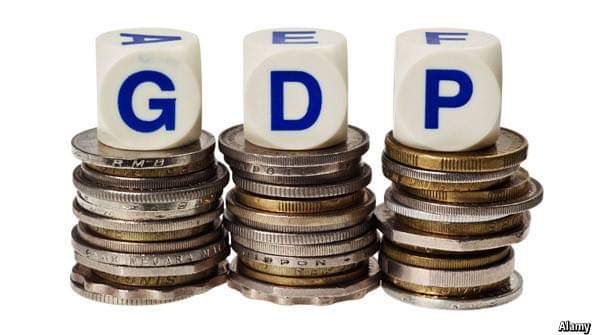
The National Bureau of Statistics (NBS) has said that the First Quarter of 2020, Nigeria’s Gross Domestic Product (GDP) grew by 1.87 per cent (year-on-year) in real terms.
In its Nigeria Gross Domestic Product Report (Q1 2020) posted on its website on Monday, the NBS said the performance was recorded against the backdrop of significant global disruption resulting from the COVID-19 public health crisis , a sharp fall in prices and restricted international trade.
NBS noted the performance recorded in the quarter under review represents a drop of -0.23 per cent point compared to Q1 2019 and 0.68 per cent point compared to Q4 2019.
According to the report, it is a reflection of the earliest effects of disruption, particularly on the non-oil economy.
NBS explained that quarter on quarter, real GDP growth was -14.42 percent compared to 5.59 per cent recorded in the preceding quarter.
In first quarter 2020 aggregate GDP stood at N35,647,406.08 million in nominal terms, said the bureau.
NBS said that this performance was higher when compared to first quarter of 2019, which recorded N31,824,349.67 million, with a nominal growth rate 12.01 per cent year on year.
The report noted that relative to first quarter of 2019, the nominal growth rate was higher by 0.11 per cent points but lower than the preceding quarter by -0.32 per cent points.
In the quarter under review, NBS said an average daily oil production of 2.07 million barrels per day was recorded.
The production level, according to the report, the production level was higher than the 1.99 million barrel per day recorded in the same quarter of 2019 by 0.08mbpd and the fourth quarter of 2019 by 0.06mbpd.
NBS added that the non-oil sector grew by 1.55 per cent in real terms during the reference quarter (Q1 2020.
The report said this was slower by -093 per cent points compared to the rate recorded during the same quarter of 20191, and -0.72 per cent point slower than the corresponding period of last year.
NBS explained tag the non-oil sector was driven by mainly Information and Communication, Financial and Insurance, Agriculture and Mining.
It said in real the Non-Oil sector contributed 90.50 per cent to the nation’s GDP in first quarter 2020, less than its share in the first quarter of 2019 which was 90.78 per cent and the forth quarter of 2019 recorded as 92.68 per cent.
The report said activities that witnessed weaker performance relative to Q1 2019 including quarrying, road transport, accommodation, food service well as real estate.
Nigeria’s GDP expands by 1.87% amid global challenges
by The Cable
Nigeria’s gross domestic product (GDP) expanded by 1.87% in the first quarter of 2020, according to the National Bureau of Statistics has shown.
The bureau, in the report which was released on Monday, said the economy reflected the earliest signs of disruptions caused by the COVID-19 pandemic.
“This performance was recorded against the backdrop of significant global disruptions resulting from the COVID-19 public health crisis, a sharp fall in oil prices and restricted international trade,” the report read.
“The performance recorded in Q1 2020 represents a drop of –0.23% points compared to Q1 2019 and –0.68% points compared to Q4 2019, reflecting the earliest effects of the disruption, particularly on the non-oil economy.
“Quarter on quarter, real GDP growth was –14.27% compared to 5.59% recorded in the preceding quarter.
“In real terms, the non-oil sector grew by 1.55%, slower by –0.93% points compared to the rate recorded during the same quarter of 2019, and –0.72% points slower than the fourth quarter of 2019.”
The non-oil sector was reported to have contributed 90.50% to the nation’s GDP in the first quarter of 2020, less than its share in the first quarter of 2019 which was 90.78% and the fourth quarter of 2019 recorded as 92.68%.
The non-oil sector was driven mainly by information and communication (telecommunications), financial and insurance (financial institutions), agriculture (crop production), mining and quarrying (crude petroleum & natural gas), and construction
Activities that witnessed weaker performance relative to Q1 2019 include quarrying, road transport, accommodation and food services as well as real estate.
During the first quarter of 2020, the NBS reported average daily oil production of 2.07 million barrels per day (mbpd), higher than the 1.99mbpd recorded in Q1 2019 by 0.08mbpd and the fourth quarter of 2019 by 0.06mbpd.













